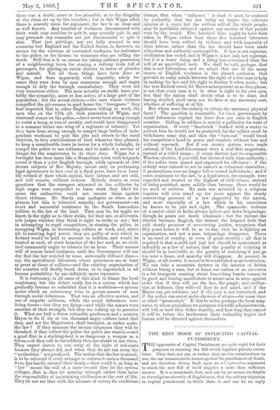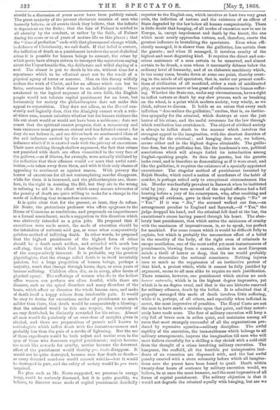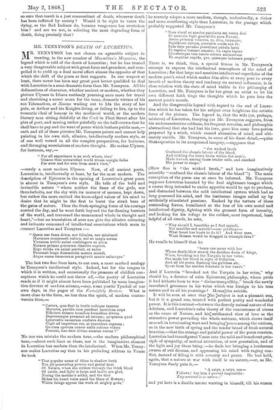THE BEST MODE OF INFLICTING CAPITAL PUN ISHMENT.
fir HE opponents of Capital Punishment are quite right for their purposes in resisting the Bill which legalizes private execu- tions. They dare not use, or rather they are too conscientious to use, the one unanswerable reason against the punishment of death, and are therefore driven back upon an ad captandenn argument to which the new Bill of itself supplies a more than sufficient answer. It is a remarkable fact, and one by no means creditable to the religious sincerity of Englishmen, that the solitary objection to capital punishment to which there is and can be no reply should in a discussion of years never have been publicly raised. The great majority of the present electorate consists of men who honestly believe, or all events think they believe, that the infinite is dependent on the finite ; that the fate of Palmer is settled to all eternity by the conduct, or rather by the faith, of Palmer during his score or so of years of mature life on this planet ; that the " time of probation " ends with that phenomenal change which, in defiance of Christianity, we call death. If that belief is correct, the infliction of death as a punishment involves the most diabolical grime it is possible for human beings to commit, the crime by which poets have always striven to interpret the mysterious saying about the Unpardonable Sin, the deliberate and wilful slaying of a soul. The sinner is put to death in his sin, without time for a sepentance which to be effectual must not be the result of a physical agony of terror or remorse. Man on this theory wilfully undoes the work of Christ, and for an offence which can but be finite, sentences his fellow sinner to an infinite penalty. Once awakened to the logical sequence of its own faith, the English people would not tolerate capital punishment for an hour, but fortunately for society the philanthropists dare not make this appeal to superstition. They dare not affirm, as the Record con- stantly and logically does, that the Almighty cannot work a rule- of-three sum, cannot calculate whether but for human violence the life cut short would or would not have been a noble one ; dare not assert that the spiritual cannot progress, that a momentary and base existence must govern an eternal and less fettered career ; for they do not believe it, and are driven back on sentimental ideas of the evil influence excited by the spectacle of an execution, an influence which if it is exerted ends with the privacy of executions. Their most striking though shallow argument, the fact that crimes not punished with death are often committed in the very face of the gallows,—as if thieves, for example, were actually titillated by the reflection that their offences would not meet that awful retri- bution,—is taken away from them, and with it their only chance of appealing to sentiment as against reason. With privacy the horror of executions for all not contemplating murder disappears, while for them it is increased, and the philanthropists are, there- fore, in the right in resisting the Bill, but they are in the wrong in refusing to aid in the effort which many sincere advocates of the penalty of death are quite willing to make for a change in the mode of inflicting that tremendous sentence.
It is quite clear that for the present, at least, they do refuse. Mr. Neste, the pretentious professor who offers epigrams to the House of Commons as resolutions, and propounds an impertinence as a formal amendment, made a suggestion in this direction which was obviously intended as a grim joke. He proposed that if executions were made secret, the mode of execution should be the inhalation of carbonic acid gas, or some other comparatively painless method of inflicting death. In other words, he proposed that the highest punishment of the highest form of crime should be a death much swifter, and attended with much less suffering, than that which God has destined for the majority of the comparatively innocent. It is probable, say the greatest physiologists, that the change called death is in itself invariably painless, but a large proportion of human beings, perhaps a majority, reach that change through hours, days, or even years of intense suffering. Children often die, as in croup, after hours of physical agony. The sufferings of women who die in the holiest office women can perform are often fearful, while there are diseases, such as the spinal disorders and many disorders of the brain, which affect or threaten the whole human race, and make of death itself a happy release from intolerable pain. It would be easy to devise for executions modes of punishment so much milder than these, that death would be comparatively a blessing ; that the criminal would in this one respect, the certainty of an easy death-bed, be distinctly rewarded for his crime. Almost all men would die painlessly of an over-dose of morphia given in alcohol, and there are preparations of prussic acid known to toxicologists which inflict death with the instantaneousness and probably less than the pain of a stroke of lightning. But the use of these expedients would be both unjust and unwise even in the eyes of those who denounce capital punishment ; unjust because too much like rewards for cruelty, unwise because the deterrent effect of the punishment would thereby pro tanto disappear. It would not be quite destroyed, because men fear death as death— or every detected murderer would commit suicide—but it would be destroyed in part, and the safety of society would be pro tanto impaired.
No plan such as Mr. Neate suggested, we presume in savage irony, could be seriously discussed, but it is quite possible, we believe, to discover some mode of capital punishment decidedly
superior to the English one, which involves at least two very great evils, the infliction of torture and the existence of an officer of State degraded by the law below all human companionship. There is little doubt that hanging, of all modes of execution now in use in Europe, is, except impalement and death by the knout, the one which most nearly approaches torture, and, therefore, exerts the greatest influence in brutalizing the spectators. Even when effi- ciently managed, it is slower than the guillotine, less certain than the garotte ; and when ill managed, it involves cruelty of the highest and most disgusting kind. It requires the direct and con- scious assistance of a man certain to be unnerved, and almost certain to be drunk, a man whom it necessarily debases below the ordinary level of humanity, and of an elaborate machinery which, in too many cases, breaks down at some one point, thereby creat- ing in the minds of all spectators, that is, under our present condi- tions of civilization of all mankind, either a rush of misdirected pity, or an increase more or less great of callousness to human suffer- ing. Whether the State can, under any circumstances, have a right to inflict torture or death by any slow process, such as breaking on the wheel, is a point which modern society, very wisely, as we think, refuses to discuss. It holds as an axiom that every such infliction " demoralizes the guillotine," excites, that is, an instinc- tive sympathy for the criminal, which destroys at once the just horror of his crime, and the useful reverence for the law through which retribution has overtaken it. The object of civilized society is always to inflict death in the manner which involves the strongest appeal to the imagination, with the shortest duration of suffering for the criminal ; and hanging does not, we believe, secure either end in the highest degree obtainable. The guillo- tine does, but the guillotine has, like the headsman's axe, political associations which will always forbid its introduction among English-speaking people. So does the garotte, but the garotte looks cruel, and is therefore as demoralizing as if it were cruel, and like the guillotine, it requires the existence of a specially appointed executioner. The singular method of punishment invented by Rajah Brooke, which cured a nation of murderers of the habit of murder, is perhaps suited only to exceptional circumstances like his. Murder was fearfully prevalent in Sarawak when he instituted trial by jury. Any man accused of the capital offence had a full hearing before a jury of his countrymen, who, after receiving and weighing all evidence, gave in their verdict by simple "No" or " Yes." If it was " No," the accused walked out frees—an arrangement peculiar to England and Sarawak,--if "Yes," the judge dropped his hand, and the criminal fell dead at the bar, the executioner's creese having passed through his heart. The abso- lutely best punishment, that which unites the minimum of cruelty with the maximum of impressiveness, is, so to speak, too perfect for mankind. For some reason which it would be difficult fully to explain, but which is probably the unconscious effect of a belief in the sanctity of the body, of the right even of criminals to escape mutilation, one of the most awful yet most instantaneous of punishments, blowing from a cannon, excites in most European minds a thrill of horror so deep, that its use would probably tend to demoralize the national conscience. Nothing injures men so much as the suppression of an instinctive protest of that kind, a protest which, while it cannot be fully justified by argument, seems to all men alike to require no such justification. There remains, however, one punishment which excites no such horror naturalis, which is in the highest degree impressive, yet which is in no degree cruel, and that is the one hitherto reserved for military offences, death by the bullet. It is admitted that if properly arranged this mode of death involves little suffering, while it is, perhaps, of all others, and especially when inflicted in secret, the most impressive of penalties. The Royal Caste are not the men to have made a mistake upon that point, and they notori- ously have made none. The fear of military execution will keep a city full of brave men in sullen quiet, and maintains among all races that most strangely successful of all the organizations pro- duced by repressive agencies—military discipline. The awful rapidity of the execution, the inexorableness which belongs to all military arrangements, impress the imagination till men who will meet bullets cheerfully for a shilling a day shrink with a cold chill from the thought of a crime involving military execution. The hangman, the scaffold, all the horrible yet unimpressive inci- dents of an execution are dispensed with, and the last awful penalty exacted with a stern solemnity before which all imagina- tions save the purest have been found to quail. Death within twenty-four hours of sentence by military execution would, we believe, be at once the most humane, and the most impressive of all forms of capital punishment. The solitary objection is that it would not degrade the criminal equally with hanging, but are we
so sure that.insult is a just concomitant of death, whenever death has been inflicted by society ? Would it be right to taunt the dying, as the Red Indians do, because vengeance has overtaken him ? and are we not, in selecting the most degrading form of death, doing precisely that?




































 Previous page
Previous page